Books to Watch in July
July 02, 2019
20 books we're interested in getting to know better in July.
In order of their release dates, here are some of the many books being published in July that we are interested in getting to know better.
 Outspoken: Why Women's Voices Get Silenced and How to Set Them Free by Veronica Rueckert, Harper Business
Outspoken: Why Women's Voices Get Silenced and How to Set Them Free by Veronica Rueckert, Harper Business
A big think, conversation-changing book, full of practical advice, about how women can learn to claim the power of their voices in the workplace and at home, and what needs to change so they can finally be heard.
From the Supreme Court to the conference room to the classroom, women find themselves interrupted much more often than their male counterparts. Worse, a 2015 Yale University study revealed that women executives who spoke more often than their peers were rated 14% less competent, while male executives who did the same thing did enjoyed a 10% competency bump. And a 2016 study from USC found women account for only a third of speaking roles in top U.S. movies.
It’s undeniable: women’s voices aren’t being heard—at work, at home, in every facet of their lives. The fault lies not with women, but in a culture that seeks to silence women’s voices. However, there are skills every woman can harness to understand her own voice and learn how to use it with confidence.
With Outspoken, Veronica Rueckert—a Peabody Award-winning former host at Wisconsin Public Radio, trained opera singer, and communications expert—teaches women to speak with the confidence, clarity, and authority that will get them heard. Outspoken provides readers with the insight, guidance, and encouragement they need to use their voice to successfully communicate in meetings, around the dinner table, and during future political debates.
Written with a warm and engaging tone, brimming with practical advice and accessible stories, Outspoken is a substantive yet entertaining analysis of why most males—and many females—don’t grant women the power to speak. Most importantly, it includes solutions for change. Positive, confident and supportive, this welcome and much need guide will help reshape the world and make it better for women—and for everyone.
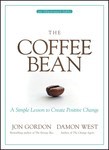 The Coffee Bean: A Simple Lesson to Create Positive Change by Jon Gordon & Damon West, Wiley
The Coffee Bean: A Simple Lesson to Create Positive Change by Jon Gordon & Damon West, Wiley
From bestselling author Jon Gordon and rising star Damon West comes The Coffee Bean: an illustrated fable that teaches readers how to transform their environment, overcome challenges, and create positive change.
Life is often difficult. It can be harsh, stressful, and feel like a pot of boiling hot water. The environments we find ourselves in can change, weaken, or harden us, and test who we truly are. We can be like the carrot that weakens in the pot or like the egg that hardens. Or, we can be like the coffee bean and discover the power inside us to transform our environment.
The Coffee Bean is an inspiring tale that follows Abe, a young man filled with stress and fear as he faces challenges and pressure at school and home. One day after class, his teacher shares with him the life-changing lesson of the coffee bean, and this powerful message changes the way he thinks, acts, and sees the world. Abe discovers that instead of letting his environment change him for the worse, he can transform any environment he is in for the better. Equipped with this transformational truth, Abe embarks on an inspirational journey to live his life like the coffee bean. Wherever his life takes him, from school, to the military, to the business world, Abe demonstrates how this simple lesson can unleash the unstoppable power within you.
A delightful, quick read, The Coffee Bean is purposely written and designed for readers of all ages so that everyone can benefit from this transformational lesson. This is a book and message that, when read and shared, has the power to change your life and the world around you. You just have to decide: are you a carrot, egg, or coffee bean?
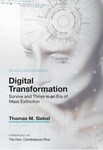 Digital Transformation: Survive and Thrive in an Era of Mass Extinction by Thomas M. Siebel, Rosetta Books
Digital Transformation: Survive and Thrive in an Era of Mass Extinction by Thomas M. Siebel, Rosetta Books
From visionary Silicon Valley entrepreneur Tom Siebel comes a penetrating examination of the new technologies that are disrupting business and government—and how organizations can harness them to transform into digital enterprises.
The confluence of four technologies—elastic cloud computing, big data, artificial intelligence, and the internet of things—is fundamentally changing how business and government will operate in the 21st century.
Siebel masterfully guides readers through a fascinating discussion of the game-changing technologies driving digital transformation and provides a roadmap to seize them as a strategic opportunity. He shows how leading enterprises such as Enel, 3M, Royal Dutch Shell, the U.S. Department of Defense, and others are applying AI and IoT with stunning results.
Digital Transformation is the guidebook every business and government leader needs to survive and thrive in the new digital age.
 The Code: Silicon Valley and the Remaking of America by Margaret O'Mara, Penguin Press
The Code: Silicon Valley and the Remaking of America by Margaret O'Mara, Penguin Press
The epic human story of how, out of a small patch of land in Northern California, high tech recreated America in its image, for good and for ill.
Long before Margaret O’Mara became one of our most consequential historians of the American-led digital revolution, she worked in the White House of Bill Clinton and Al Gore in the earliest days of the commercial Internet. There she saw first-hand how deeply intertwined Silicon Valley was with the federal government, and always had been, and how shallow the common understanding of the secrets of the Valley’s success actually was. Now, after almost five years of pioneering research, O’Mara has produced the definitive history of Silicon Valley for our time, the story of mavericks and visionaries, but also of powerful institutions creating the framework for innovation, from the Pentagon to Stanford University. It is also a story of a community that started off remarkably homogeneous and elitist and stayed that way, and whose belief in its own mythology has deepened into a collective hubris that has led to astonishing triumphs as well as devastating second-order effects.
Deploying a wonderfully rich and diverse cast of protagonists, from the justly famous to the unjustly obscure, across four generations of explosive growth in the Valley, from the Forties to the present, O’Mara has wrestled into magnificent narrative form one of the most fateful developments in modern American history. She is on the ground with all of the key tech companies, and chronicles the evolution in their offerings through each successive era, and she has a profound fingertip feel for the politics of the sector, and its relation to the larger cultural narrative about tech as it has evolved over the years. Perhaps most impressively, O’Mara has penetrated the inner kingdom of tech venture capital firms, the insular and still remarkably old-boy world that became the cockpit of American capitalism and the crucible for bringing technological innovation to market, or not.
The transformation of big tech into the engine room of the American economy and the nexus of so many of our hopes and dreams—and increasingly nightmares—can be understood, in Margaret O’Mara’s masterful hands, as the story of one California valley. As her majestic history makes clear, its fate is the fate of us all.
 How to Make a Plant Love You: Cultivate Green Space in Your Home and Heart by Summer Rayne Oakes, Optimism Press
How to Make a Plant Love You: Cultivate Green Space in Your Home and Heart by Summer Rayne Oakes, Optimism Press
Summer Rayne Oakes, an urban houseplant expert and environmental scientist, is the icon of wellness-minded millennials who want to bring nature indoors. Summer has managed to grow 1,000 houseplants in her Brooklyn apartment (and they’re thriving!) Her secret? She approaches her relationships with plants as intentionally as if they were people.
Everyone deserves to feel the inner peace that comes from taking care of greenery. Beyond the obvious benefits—beauty and cleaner air—there’s a strong psychological benefit to nurturing plants as a path to mindfulness. They can reduce our stress level, lower our blood pressure, and improve our overall outlook. And they offer a rare opportunity to find joy by caring for another living being.
When Summer Rayne Oakes moved to Brooklyn from the Pennsylvania countryside, she knew that bringing nature indoors was her only chance to stay sane. She found them by the side of the road, in long-forgotten window boxes, at farmers’ markets, and in local garden shops. She found ways to shelve, hang, tuck, anchor, secure, and suspend them. She even installed 150-foot expandable hose that connects to pipes under her kitchen sink, so she only has to spend about a half-hour a day tending to her plants—an activity that she describes as a “moving meditation.”
This is Summer’s guidebook for cultivating an entirely new relationship with your plant children. Inside, you’ll learn to:
- Pause for the flowers and greenery all around you, even the ones sprouting bravely between cracked pavement
- Trust that your apartment jungle offers you far more than pretty décor
- See the world from a plant’s perspective, trading modern consumerism for sustainability
- Serve your chlorophyllic friends by learning to identify the right species for your home and to recreate their natural habitat (Bonus: your indoor garden won’t die!)
When we become plant parents, we also become better caretakers of ourselves, the people around us, and our planet. So, let’s step inside the world of plants and discover how we can begin cultivating our own personal green space—in our homes, in our minds, and in our hearts.
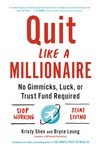 Quit Like a Millionaire: No Gimmicks, Luck, or Trust Fund Required by Kristy Shen, Bryce Leung, and JL Collins, TarcherPerigee
Quit Like a Millionaire: No Gimmicks, Luck, or Trust Fund Required by Kristy Shen, Bryce Leung, and JL Collins, TarcherPerigee
From two leaders of the FIRE (Financial Independence, Retire Early) movement, a bold, contrarian guide to retiring at any age, with a reproducible formula to financial independence.
Kristy Shen retired with a million dollars at the age of thirty-one, and she did it without hitting a home run on the stock market, starting the next Snapchat in her garage, or investing in hot real estate. Learn how to cut down on spending without decreasing your quality of life, build a million-dollar portfolio, fortify your investments to survive bear markets and black-swan events, and use the 4 percent rule and the Yield Shield so you can quit the rat race forever.
Not everyone can become an entrepreneur or a real estate baron; the rest of us need Shen’s mathematically proven approach to retire decades before sixty-five.
 For the Good of the Game: The Inside Story of the Surprising and Dramatic Transformation of Major League Baseball by Bud Selig, WIlliam Morrow
For the Good of the Game: The Inside Story of the Surprising and Dramatic Transformation of Major League Baseball by Bud Selig, WIlliam Morrow
The longtime Commissioner of Major League Baseball provides an unprecedented look inside professional baseball today, focusing on how he helped bring the game into the modern age and revealing his interactions with players, managers, fellow owners, and fans nationwide.
More than a century old, the game of baseball is resistant to change—owners, managers, players, and fans all hate it. Yet, now more than ever, baseball needs to evolve—to compete with other professional sports, stay relevant, and remain America’s Pastime it must adapt. Perhaps no one knows this better than Bud Selig who, as the head of MLB for more than twenty years, ushered in some of the most important, and controversial, changes in the game’s history—modernizing a sport that had remained unchanged since the 1960s.
In this enlightening and surprising book, Selig goes inside the most difficult decisions and moments of his career, looking at how he worked to balance baseball’s storied history with the pressures of the twenty-first century to ensure its future. Part baseball story, part business saga, and part memoir, For the Good of the Game chronicles Selig’s career, takes fans inside locker rooms and board rooms, and offers an intimate, fascinating account of the frequently messy process involved in transforming an American institution. Featuring an all-star lineup of the biggest names from the last forty years of baseball, Selig recalls the vital games, private moments, and tense conversations he’s shared with Hall of Fame players and managers and the contentious calls he’s made. He also speaks candidly about hot-button issues the steroid scandal that threatened to destroy the game, telling his side of the story in full and for the first time.
As he looks back and forward, Selig outlines the stakes for baseball’s continued transformation—and why the changes he helped usher in must only be the beginning.
 Colonize This!: Young Women of Color on Today's Feminism, edited by Daisy Hernández & Bushra Rehman, Seal Press
Colonize This!: Young Women of Color on Today's Feminism, edited by Daisy Hernández & Bushra Rehman, Seal Press
Newly revised and updated, this landmark anthology offers gripping portraits of American life as seen through the eyes of young women of color
It has been decades since women of color first turned feminism upside down, exposing the feminist movement as exclusive, white, and unaware of the concerns and issues of women of color from around the globe. Since then, key social movements have risen, including Black Lives Matter, transgender rights, and the activism of young undocumented students. Social media has also changed how feminism reaches young women of color, generating connections in all corners of the country. And yet we remain a country divided by race and gender.
Now, a new generation of outspoken women of color offer a much-needed fresh dimension to the shape of feminism of the future. In Colonize This!, Daisy Hernandez and Bushra Rehman have collected a diverse, lively group of emerging writers who speak to the strength of community and the influence of color, to borders and divisions, and to the critical issues that need to be addressed to finally reach an era of racial freedom. With prescient and intimate writing, Colonize This! will reach the hearts and minds of readers who care about the experience of being a woman of color, and about establishing a culture that fosters freedom and agency for women of all races.
 This Land: How Cowboys, Capitalism, and Corruption are Ruining the American West by Christopher Ketcham, Viking
This Land: How Cowboys, Capitalism, and Corruption are Ruining the American West by Christopher Ketcham, Viking
A hard-hitting look at the battle now raging over the fate of the public lands in the American West—and a plea for the protection of these last wild places
The public lands of the western United States comprise some 450 million acres of grassland, steppe land, canyons, forests, and mountains. It’s an American commons, and it is under assault as never before.
Journalist Christopher Ketcham has been documenting the confluence of commercial exploitation and governmental misconduct in this region for over a decade. His revelatory book takes the reader on a journey across these last wild places, to see how capitalism is killing our great commons. Ketcham begins in Utah, revealing the environmental destruction caused by unregulated public lands livestock grazing, and exposing rampant malfeasance in the federal land management agencies, who have been compromised by the profit-driven livestock and energy interests they are supposed to regulate. He then turns to the broad effects of those corrupt politics on wildlife. He tracks the Department of Interior’s failure to implement and enforce the Endangered Species Act—including its stark betrayal of protections for the grizzly bear and the sage grouse—and investigates the destructive behavior of U.S. Wildlife Services in their shocking mass slaughter of animals that threaten the livestock industry. Along the way, Ketcham talks with ecologists, biologists, botanists, former government employees, whistleblowers, grassroots environmentalists and other citizens who are fighting to protect the public domain for future generations.
This Land is a colorful muckraking journey—part Edward Abbey, part Upton Sinclair—exposing the rot in American politics that is rapidly leading to the sell-out of our national heritage. The book ends with Ketcham’s vision of ecological restoration for the American West: freeing the trampled, denuded ecosystems from the effects of grazing, enforcing the laws already in place to defend biodiversity, allowing the native species of the West to recover under a fully implemented Endangered Species Act, and establishing vast stretches of public land where there will be no development at all, not even for recreation.
 Everything Below the Waist: Why Health Care Needs a Feminist Revolution by Jennifer Block, St. Martin's Press
Everything Below the Waist: Why Health Care Needs a Feminist Revolution by Jennifer Block, St. Martin's Press
An eye-opening, investigative account of the dismal state of women's healthcare in the U.S.
American women visit more doctors, have more surgery, and fill more prescriptions than men. In Everything Below the Waist, Jennifer Block asks: Why is the life expectancy of women today declining relative to women in other high-income countries, and even relative to the generation before them? Block examines several staples of modern women's health care, from fertility technology to contraception to pelvic surgery to miscarriage treatment, and finds that while overtreatment and mistreatment persist in medicine writ large, they are particularly acute for women. One third of mothers give birth by major surgery; roughly half of women lose their uterus to hysterectomy.
Feminism turned the world upside down, yet to a large extent the doctors' office has remained stuck in time. Block returns to the 1970s women's health movement to understand how in today's supposed age of empowerment, women's bodies are still so vulnerable to medical control—particularly their sex organs, and as result, their sex lives.
In this urgent book, Block tells the stories of patients, clinicians, and reformers, uncovering history and science that could revolutionize the standard of care, and change the way women think about their health. Everything Below the Waist challenges all people to take back control of their bodies.
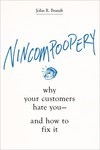 Nincompoopery: Why Your Customers Hate You—and How to Fix It by John R. Brandt, HarperCollins Leadership
Nincompoopery: Why Your Customers Hate You—and How to Fix It by John R. Brandt, HarperCollins Leadership
Find and kill the corporate stupidity that drives customers crazy. CEO and award-winning business writer John R. Brandt offers concrete examples of how any organization—large or small, and regardless of industry—can innovate in ways that delight customers and attract top-level talent.
Nincompoopery—terrible customer service, idiotic business processes, and soul-crushing management practices—surrounds all of us. We lose time, patience, and profits as stuck-in-the-past organizations actively prevent us (and our customers) from getting the value we (and they) deserve.
Can't anybody change this? CEO and award-winning business writer John R. Brandt says we can. In Nincompoopery: Why Your Customers Hate You—And How to Fix It, he leverages research across thousands of companies to show leaders how to find and kill the corporate stupidity that drives customers crazy. More importantly, he offers concrete examples of how any organization—large or small, and regardless of industry—can innovate in ways that delight customers and attract top-level talent.
Brandt has worked with hundreds of companies to help them outwit competitors, and in the blunt (and funny) Nincompoopery, he shares his unique blueprint for success. It usually starts by asking a simple question or two, such as
- Why should our customers have to rekey their data multiple times to make a single purchase?
- Why are there four levels of approval just to order basic supplies?
- Why can't we get qualified candidates for open positions, or provide new employees with decent training?
- In short: How did we become such nincompoops? And when will we stop?
Nincompoopery offers leaders the answers they need—and the profits they crave—with a scoop of humor on the side. Enjoy!
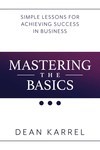 Mastering the Basics: Simple Lessons for Achieving Success in Business by Dean Karrel, Post Hill Press
Mastering the Basics: Simple Lessons for Achieving Success in Business by Dean Karrel, Post Hill Press
Are you limiting your potential because you haven’t mastered workplace skills, office politics, and career development?
Do you ever feel pressured to learn the latest strategies just to stay ahead of your peers? Are there times when you feel intimidated by colleagues with fancy titles or advanced degrees who don’t shy away from sharing their opinions? We can all fall into the trap of getting caught up in a competitive and stressful work environment and the result can negatively impact our confidence and ability to maximize our potential. Based on business lessons and techniques that Dean Karrel learned throughout his career this book reveals that common sense, integrity, character, and the importance of self-confidence are the critical cornerstones of being successful and fulfilled in business. Being yourself, working to the best of your ability, and mastering the basics is what can set you apart from the rest!
Just a few of the nearly two hundred topics covered include:
- Learning social and soft skills
- The value of emotional intelligence
- The importance of planning and preparation
- Working for a micromanager
- Keeping things simple and avoiding distractions
- Vulnerability is a positive quality
- Prioritizing and focusing on what really matters
- Why you shouldn’t be afraid you don’t know something
 Stronghold: One Man's Quest to Save the World's Wild Salmon by Tucker Malarkey, Spiegel & Grau
Stronghold: One Man's Quest to Save the World's Wild Salmon by Tucker Malarkey, Spiegel & Grau
One man’s bold mission to save the world’s last great salmon habitat—before it’s too late.
In the tradition of Mountains Beyond Mountains and The Orchid Thief, Stronghold is Tucker Malarkey’s gripping account of one man’s determination to protect the world’s last bastion for wild salmon. From a young age, Guido Rahr was a misfit among his family and classmates, preferring to spend his time in the natural world, on his family’s land on the Deschutes River in Oregon. Over the years, as he became an expert fly fisherman, he noticed that each year fewer salmon were returning to their place of birth to spawn, and set out to learn why. What he discovered alarmed him; as the river homes of these fish became increasingly inhospitable to them, due to dams, industry, and climate change, the salmon of the Pacific Rim seemed destined to quickly go the way of the salmon who once filled the Atlantic Ocean: near extinction.
An improbable and inspiring story, Stronghold takes us on a wild and at times dangerous adventure—from Oregon to Alaska to one of the world’s last remaining salmon strongholds, in the Russian Far East—a landscape of ecological richness and diversity that is rapidly being developed for oil, gas, minerals, and timber. As Rahr befriends and navigates scientists, conservationists, corrupt officials, Russian oligarchs, unexpected allies, and impenetrable bureaucracies, he reveals the astonishing natural history of the endangered salmon, an extraordinary species whose demise will reverberate across the planet. And he sets into motion a plan that can secure their survival.
Tucker Malarkey, who accompanies Rahr to the Russian wilderness and reports from up close, has written a clarion call for a sustainable future, a beautiful and riveting account of a species whose future is closely linked to that of our own.
 Because Internet: Understanding the New Rules of Language by Gretchen McCulloch, Riverhead Books
Because Internet: Understanding the New Rules of Language by Gretchen McCulloch, Riverhead Books
A linguistically informed look at how our digital world is transforming the English language.
Language is humanity’s most spectacular open-source project, and the internet is making our language change faster and in more interesting ways than ever before. Internet conversations are structured by the shape of our apps and platforms, from the grammar of status updates to the protocols of comments and @replies. Linguistically inventive online communities spread new slang and jargon with dizzying speed. What’s more, social media is a vast laboratory of unedited, unfiltered words where we can watch language evolve in real time.
Even the most absurd-looking slang has genuine patterns behind it. Internet linguist Gretchen McCulloch explores the deep forces that shape human language and influence the way we communicate with one another. She explains how your first social internet experience influences whether you prefer “LOL” or “lol,” why ~sparkly tildes~ succeeded where centuries of proposals for irony punctuation had failed, what emoji have in common with physical gestures, and how the artfully disarrayed language of animal memes like lolcats and doggo made them more likely to spread.
Because Internet is essential reading for anyone who’s ever puzzled over how to punctuate a text message or wondered where memes come from. It’s the perfect book for understanding how the internet is changing the English language, why that’s a good thing, and what our online interactions reveal about who we are.
 Trust First: A True Story About the Power of Giving People Second Chances by Bruce Deel, with Sara Grace, Optimism Press
Trust First: A True Story About the Power of Giving People Second Chances by Bruce Deel, with Sara Grace, Optimism Press
If we choose to trust unconditionally, how many lives could we change?
When Pastor Bruce Deel took over the Mission Church in the 30314 zip code of Atlanta, he had orders to shut it down. The church was old and decrepit, and its neighborhood—known as “Better Leave, You Effing Fool,” or “the Bluff,” for short—had the highest rates of crime, homelessness, and incarceration in Georgia. Expecting his time there to only last six months, Deel was not prepared for what happened next. One Sunday, he was approached by a woman he didn’t know. “I’ve been hooking and stripping for fourteen years,” she said. “Can you help me?”
Soon after, Bruce founded an organization called City of Refuge rooted in the principle of radical trust. Other nonprofits might drug test before offering housing, lock up valuables, or veto a program giving job skills and character references to felons as “a liability.” But Bruce believed the best way to improve outcomes for the marginalized and impoverished was to extend them trust, even if that trust was violated multiple times—and even if someone didn’t yet trust themselves. Since then, City of Refuge has helped over 20,000 people in Atlanta’s toughest neighborhood escape the cycles of homelessness, joblessness, and drug abuse.
Of course, trust alone can’t overcome a broken system that perpetuates inequality. Presenting an unvarnished window into the lives of ex-cons, drug addicts, human trafficking survivors, and displaced souls who have come through City of Refuge, Trust First examines the context in which Bruce’s Atlanta neighborhood went downhill—and what City of Refuge chose to do about it. They’ve become a one-stop-shop for transitional housing, on-site medical and mental health care, childcare, and vocational training, including accredited intensives in auto tech, culinary arts, and coding. While most social services focus on one pain point and leave the burden on the poor to find the crosstown bus that’ll serve their other needs, Bruce argues that bringing someone out of homelessness requires treating all of their needs simultaneously. This model has proven so effective that a dozen new chapters of City of Refuge have opened in the US, including in California, Illinois, Ohio, Maryland, Virginia, Texas, and Georgia.
More than a narrative about a single place in time, this radical primer for behavioral change belongs on every leader’s shelf. Heartfelt, deeply personal, and inspiring, Trust First will break down your assumptions about whether anyone is ever truly a lost cause. Bruce will donate a portion of his proceeds from Trust First to the charitable organization City of Refuge.
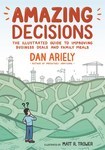 Amazing Decisions: The Illustrated Guide to Improving Business Deals and Family Meals by Dan Ariely, illustrated by Matt R. Trower, Hill & Wang
Amazing Decisions: The Illustrated Guide to Improving Business Deals and Family Meals by Dan Ariely, illustrated by Matt R. Trower, Hill & Wang
A bestselling author’s cartoon guide to better decision-making.
The internationally renowned author Dan Ariely is known for his incisive investigations into the messy business of decision-making. Now, in Amazing Decisions, his unique perspective—informed by behavioral economics, neuroscience, and psychology—comes alive in the graphic form. The illustrator Matt R. Trower’s playful and expressive artwork captures the lessons of Ariely’s groundbreaking research as they explore the essential question: How can we make better decisions?
Amazing Decisions follows the narrator, Adam, as he faces the daily barrage of choices and deliberations. He juggles two overlapping—and often contradictory—sets of norms: social norms and market norms. These norms inform our thinking in ways we often don’t notice, just as Adam is shadowed by the “market fairy” and the “social fairy,” each compelling him to act in certain ways. Good decision-making, Ariely argues, requires us to identify and evaluate the forces at play under different circumstances, leading to an optimal outcome. Amazing Decisions is a fascinating and entertaining guide to developing skills that will prove invaluable in personal and professional life.
 The Making of a Democratic Economy: How to Build Prosperity for the Many, Not the Few by Marjorie Kelly & Ted Howard, Berrett-Koehler
The Making of a Democratic Economy: How to Build Prosperity for the Many, Not the Few by Marjorie Kelly & Ted Howard, Berrett-Koehler
Our economy is designed by the 1 percent, for the 1 percent. This book offers a compelling vision of an equitable, ecologically sustainable alternative that meets the essential needs of all people.
We live in a world where twenty-six billionaires own as much wealth as half the planet’s population. The extractive economy we live with now enables the financial elite to squeeze out maximum gain for themselves, heedless of damage to people or planet. But Marjorie Kelly and Ted Howard show that there is a new economy emerging focused on helping everyone thrive while respecting planetary boundaries.
At a time when competing political visions are at stake the world over, this book urges a move beyond tinkering at the margins to address the systemic crisis of our economy. Kelly and Howard outline seven principles of what they call a Democratic Economy: community, inclusion, place (keeping wealth local), good work (putting labor before capital), democratized ownership, ethical finance, and sustainability. Each principle is paired with a place putting it into practice: Pine Ridge, Preston, Portland, Cleveland, and more.
This book tells stories not just of activists and grassroots leaders but of the unexpected accomplices of the Democratic Economy. Seeds of a future beyond corporate capitalism and state socialism are being planted in hospital procurement departments, pension fund offices, and even company boardrooms.
The road to a system grounded in community, democracy, and justice remains uncertain. Kelly and Howard help us understand we make this road as we walk it by taking a first step together beyond isolation and despair.
 Why Digital Transformations Fail: The Surprising Disciplines of How to Take Off and Stay Ahead by Tony Saldanha, Berrett-Koehler
Why Digital Transformations Fail: The Surprising Disciplines of How to Take Off and Stay Ahead by Tony Saldanha, Berrett-Koehler
Former Procter & Gamble Vice President for IT and Shared Services, Tony Saldanha gives you the keys to a successful digital transformation: a proven five-stage model and a disciplined process for executing it.
Digital transformation is more important than ever now that we’re in the Fourth Industrial Revolution, where the lines between the physical, digital, and biological worlds are becoming ever more blurred. But fully 70 percent of digital transformations fail.
Why? Tony Saldanha, a globally awarded industry thought-leader who led operations around the world and major digital changes at Procter & Gamble, discovered it’s not due to innovation or technological problems. Rather, the devil is in the details: a lack of clear goals and a disciplined process for achieving them. In this book, Saldanha lays out a five-stage process for moving from digitally automating processes here and there to making digital technology the very backbone of your company. For each of these five stages, Saldanha describes two associated disciplines vital to the success of that stage and a checklist of questions to keep you on track.
You want to disrupt before you are disrupted—be the next Netflix, not the next Blockbuster. Using dozens of case studies and his own considerable experience, Saldanha shows how digital transformation can be made routinely successful, and instead of representing an existential threat, it will become the opportunity of a lifetime.
 Surrounded by Idiots: The Four Types of Human Behavior and How to Effectively Communicate with Each in Business (and in Life) by Thomas Erikson, St. Martin's Essentials
Surrounded by Idiots: The Four Types of Human Behavior and How to Effectively Communicate with Each in Business (and in Life) by Thomas Erikson, St. Martin's Essentials
Master the four basic behavior types and change the way you communicate!
A runaway bestseller in Sweden that has sold more than a million copies worldwide, Surrounded by Idiots shares a groundbreaking new method of understanding the people around you that will change how you interact with everyone from your coworkers to your spouse.
Author Thomas Erikson explains that there are four key behavior types that define how we interact with and perceive the people around us. Understanding someone’s pattern of behavior is the key to successful communication. Erikson breaks down the four kinds of behavior types—Reds who are dominant and commanding, Yellows who are social and optimistic, Greens who are laid back and friendly, and Blues who are analytical and precise—and explains how to identify and interact with each type of person. Instead of being bogged down with overly technical categorizations, the simple four color system allows you to speedily identify a friend or coworker and adjust how you speak and share with them.
Surrounded by Idiots is full of practical information for interacting with people based on their color, including the strengths and weaknesses of all the profiles, how to give positive and negative feedback to each, and the best way to word an email when writing to someone with a different profile.
 Quantum Leadership: New Consciousness in Business by Frederick Chavalit Tsao & Chris Laszlo, Stanford Business Books
Quantum Leadership: New Consciousness in Business by Frederick Chavalit Tsao & Chris Laszlo, Stanford Business Books
Solving the world's sustainability challenges requires business creativity, and that will come about only when business leaders are able to raise their consciousness — through mindfulness and practices that increase their awareness of how their actions impact others as well as generations to come.
In this new book, Frederick Chavalit Tsao and Chris Laszlo argue that current approaches to leadership fail to produce positive outcomes for either businesses or the communities they serve. Employee disengagement and customer fickleness remain high, resulting in a lack of creativity and collaboration at all levels of entrepreneurial activity. Investor demand for Environmental, Social, and Governance (ESG) continues to be poorly integrated into profit strategies.
Drawing on extensive research, this book shows how changing a person's consciousness is the most powerful lever for unlocking his or her leadership potential to create wealth and serve humankind. A wide range of practices of connectedness provide the keys. The journey to higher consciousness changes people at a deep intuitive level, combining embodied experience with analytic-cognitive skill development. Tsao and Laszlo show how leaders who pursue this journey are more likely to flourish with significant benefits to both business and society. These include greater creativity and collaboration along with an increased capability to inspire people and produce lasting change. Readers will come away with a deep understanding of quantum leadership and the day-to-day practices that can help them achieve greater effectiveness and wellbeing at work.

